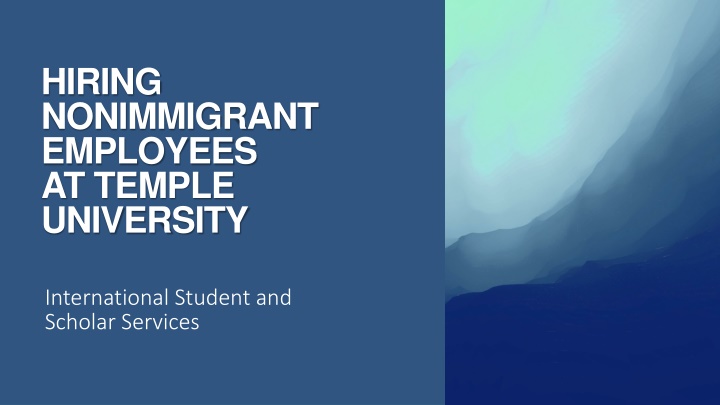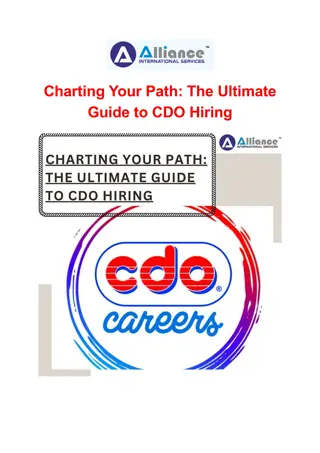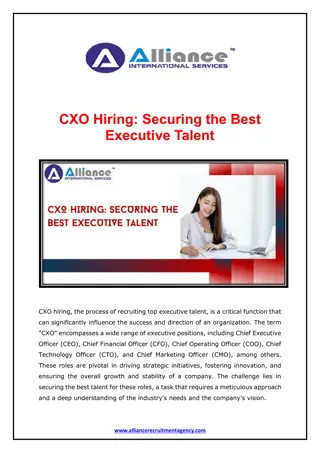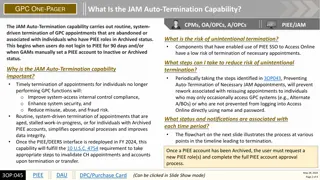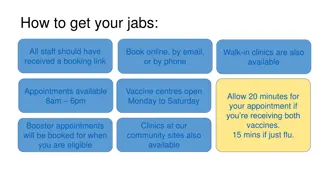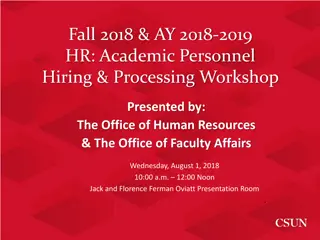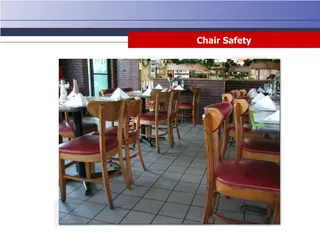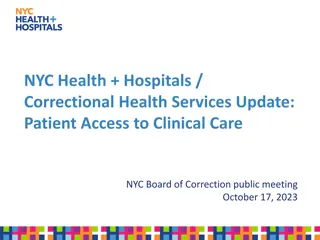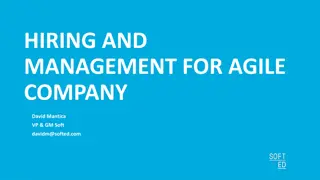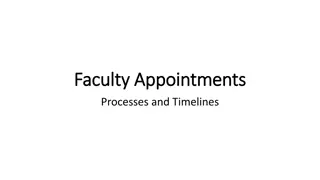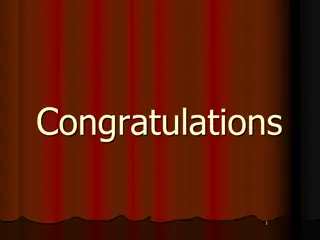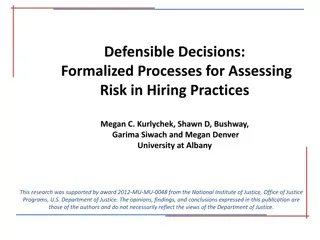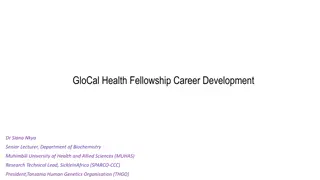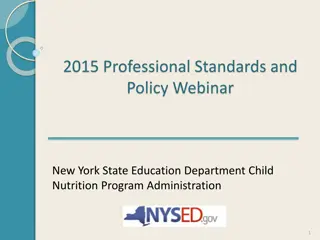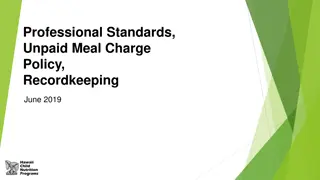Department Chair Appointments and Lecturer Hiring Overview
This content provides details about department chair appointments, lecturer hiring procedures, and establishing applicant pools for part-time faculty. Learn about chair roles, lecturer entitlements, evaluation criteria, applicant pools, and important considerations in the hiring process.
Download Presentation

Please find below an Image/Link to download the presentation.
The content on the website is provided AS IS for your information and personal use only. It may not be sold, licensed, or shared on other websites without obtaining consent from the author.If you encounter any issues during the download, it is possible that the publisher has removed the file from their server.
You are allowed to download the files provided on this website for personal or commercial use, subject to the condition that they are used lawfully. All files are the property of their respective owners.
The content on the website is provided AS IS for your information and personal use only. It may not be sold, licensed, or shared on other websites without obtaining consent from the author.
E N D
Presentation Transcript
HIRING NONIMMIGRANT EMPLOYEES AT TEMPLE UNIVERSITY International Student and Scholar Services
ISSS Contact Information 215-204-7708 isss.temple.edu Martyn J. Miller, Ph.D., Assistant Vice President, Office of Global Engagement mjmiller@temple.edu 215-204-4682 Joan McGinley, Director joanw@temple.edu 215-204-1272 Answers immigration questions if Primary is not available; J-1 Scholars Sharon Loughran, Immigration Services Advisor sharonl@temple.edu 215-204-3805 H-1B, E-3, TN and O-1s
US Government Agencies to Know U.S. Department of Homeland Security (DHS): DHS combined 22 different federal departments and agencies into a unified, integrated cabinet agency in 2002 US Citizenship and Immigration Service (USCIS): Holds authority over all aliens in the United States, including international scholars and employees in J and H-1B visa status US Department of Labor (DOL): Holds authority over Labor Condition Application (LCA) needed for H-1B Petition US Customs and Border Protection (CBP): Responsible for admitting internationals into the US US Immigration and Customs Enforcement (ICE): Enforces federal laws governing border control, customs, trade and immigration to promote homeland security and public safety; oversees SEVIS, the software system used for F and J students/scholars US Department of State Authority over issuances of all US non-immigrant and immigrant visas; Waiver Office handles J-1 Waivers and Advisory Opinions
ISSS only has authority for immigration matters ISSS advisors may only assist with immigration matters. Our office is not authorized to assist with the following: Determine job/appointment title Taxes (HR/Payroll Management) Obtaining Temporary SS#s (HR), TU email or TU ID#s Onboarding including I-9 Forms (HR/Payroll Management) TU Sponsorship for Permanent Residence [green card] Department Chair/Dean must contact Karen Ward in HR for University Positions or TUHS HR Employment Verification Letters
USCIS Increases Some Filing Fees as of April 1, 2024 Premium Processing Fee increases from $2500 to $2805 on February 26, 2024 H-1B I-129 filing fee remains the same O-1 Petitions filed by nonprofits will increase to $530 E-3 and TN Petitions will increase from $460 to $510 I-539 filing fee (change of status and student reinstatement) will increase depending on whether the petition is filed electronically or submitted as a paper filing to $420 and $475, respectively. I-765 (EAD such as F-1 OPT or J-2 Work Authorization) filing fees will increase depending on whether the petition is filed electronically or submitted as a paper filing to $420 and $475, respectively.
DestinyOne Training Video ISSS has prepared a DestinyOne Training Video to assist you with ISSS immigration applications.
F-1 and J-1Students isss.temple.edu/hosting-departments/information- departments/hiring-foreign-nationals-temple-university/practical- training-f%E2%80%901-and-j-1-students
F-1 Practical Training Practical training is a legal means by which F 1 students can obtain employment in areas directly related to their academic field of study. Students, in general, must have completed one academic year (approximately nine months) in F 1 status and must maintain their F 1 status to be eligible for practical training. There are two types of practical training: 1.Curricular Practical Training 2.Optional Practical Training
F-1 Curricular Practical Training The regulations state that a student may participate in a "curricular practical training program" that is "an integral part of an established curriculum" and "directly related to the student's major area of study." They define curricular practical training as "alternate work/study, internship, cooperative education, or any other type of required internship or practicum which is offered by sponsoring employers through cooperative agreements with the school."
F-1 Optional Practical Training Optional Practical Training (OPT) must be authorized by the U.S. Citizenship and Immigration Services (USCIS) based on a recommendation from the designated school official (DSO) at the school which issued the I 20 to the student. Form I 20 is a government document which verifies the student's admission to that institution. Students are eligible for 12 months of OPT for each higher degree level. Students who obtain a degree in Science, Technology, Engineering, and Mathematics (STEM) may be eligible for an additional 24 months of OPT, depending on whether their employer is enrolled in the e-verify program
F-1 Optional Practical Training Pre Completion OPT can be used by F 1 students prior to the completion of their studies. Students can request to work: part time, a maximum of 20 hours per week, while school is in session full time during vacation when school is not in session or full time/part time after completing all course requirements for the degree excluding thesis or equivalent. Post Completion OPT can be authorized for full time employment after completion of the course of study.
F-1 Optional Practical Training The types of employment allowed during the initial 12-month period of OPT include the following: Paid employment Paid employment Students may work part time (at least 20 hours per week when on post-completion OPT) or full time in a job related to their field of study. Unpaid employment Unpaid employment Students on the initial 12-month OPT may work as volunteers or unpaid interns, where this does not violate any labor laws. The applicant may not "volunteer" for a position that is normally The applicant may not "volunteer" for a position that is normally paid. paid. The work must be at least 20 hours per week. These students must be able to provide evidence from the employer that the student worked at least 20 hours per week during the period of employment. Multiple employers Multiple employers Students may work for more than one employer, but all employment must be related to the student s degree program. These requirements do not apply to the STEM OPT Extension
Work Authorization Employment Authorization Document (EAD): Students who have received OPT permission will be issued an EAD by the USCIS. Employers should note that the average processing time for USCIS to issue the EAD is two or three months, though student can now request premium processing with an additional fee Students may begin employment only after they receive the EAD which will indicate the start and end dates of employment. Students who have a pending STEM extension application can continue working for up to 180 days while the application is pending. Curricular Practical Training (CPT) may be authorized by the institution (not by USCIS) for F 1 students participating in curricular related employment such as cooperative education, work study, practicum and internship programs.
J-1 Student Academic Training International students on J 1 visas are eligible for up to 18 months of work authorization, called academic training for the duration of their academic program. No additional time is given to higher levels of study Post doctoral students may apply for an additional 18 months of Academic Training. Some J 1 program participants are also allowed to work part time during the academic program. Students should consult with the Responsible Officer (RO) or Alternate Responsible Officer (ARO) at their institution.
Employer Does Not Need to Complete a D1 Application for CPT / OPT / AT The Hiring Department will not need to complete an application in DestinyOne when employing a foreign national who has Curricular Practical Training, Optional Practical Training or Academic Training. The student must complete an I-9 with HR within 3 days of beginning employment.
Continuing Employment after the Practical/Academic Training Period Federal regulations require that students terminate their employment at the conclusion of the authorized practical or academic training. However, students on an F 1 visa, or students on a J 1 visa who are not subject to a two year home residency requirement, may continue to be employed, if they receive approval for a change in visa category usually to an H 1B. The student must have a minimum of a bachelor's degree to qualify for H 1B status. Note that the job must require at least a bachelor s degree in a specific field.
H-1B Specialty Occupation Workers isss.temple.edu/faculty-staff-and-researchers/international- employees/h-1b-specialty-occupation-workers
Department of State Stateside Visa Renewal Pilot Program From January 29 to April 1, 2024, the Department of State will run a pilot program to resume domestic visa renewal for H-1B applicants who are renewing an H-1B visa that was issued by: Mission Canada with an issuance date from January 1, 2020, through April 1, 2023; or Mission India with an issuance date of February 1, 2021, through September 30, 2021; ... and who meet all other additional conditions specified by the pilot program notice. H-1B visa holders whose visas were issued in countries other than Canada or India or issued in those countries outside the specified issuance dates are not eligible to participate in the pilot program. H-4 dependents are likewise not eligible to participate in the pilot.
J-1 Two-Year Home Residency Requirement Any H-1B Applicant who has ever held J-1 status must submit an Advisory Opinion to the Dept of State even if her/his DS-2019 Form and/or J-1 visa stamp indicates Not Subject . USCIS has updated their Policy Manual indicating that the preliminary endorsements on DS-2019 Forms and Visa Stamps are not a clear indicator if someone is subject. Only the Department of State Waiver Office and USCIS can make that decision. If the applicant s DS-2019 Forms/J-1 visa stamps indicate Subject , most likely the applicant must apply for a waiver of the Two-Year Home Residency Requirement.
J-1 Should Not Apply for Waiver Without First Speaking with ISSS ISSS Cannot Extend J-1 Program Once The Department of State Recommends a J Waiver Department Should try to extend J-1 Program to full five years going into the 4th and 5th years so that J-1 can apply for a waiver during the 4th year. Waiver applications can take a year or longer to process. ISSS cannot extend a J-1 Program beyond the 5th year.
Transition from J Scholar to H-1B Years 1 & 2 Year 3 Year 4 3 Months Prior to J-1 Program End Date July 1, 2024 to June 30, 2026 July 1, 2026 to June 30, 2027 July 1, 2027 to June 30, 2029 Apply for waiver by January 2028 if J-1 has DS-2019 valid until June 30 2029 Decide if the program is a good fit between J-1 Scholar and Department If Dept extends DS-2019 to 5th Year Maximum, J-1 can apply for waiver once DS-2019 is extended. J-1 should apply for a waiver no later than the middle of 4th year but only after J program has been extended for full 5 years Employer should submit H-1B Petition at least 3 months prior to the end of J Program but only if J-1 Residency Requirement has been satisfied or if J-1 has Advisory Opinion indicating s/he is not subject to the Requirement Do not apply for a waiver if DS-2019 is only extended through the 3rd or 4th Year.
H-1B Processing Fees Departments are required to pay mandatory processing fees associated with H-1B employment: $460 Application fee is required for every H-1B Petition $500 anti-fraud fee is required for New Employment and Transfer Petitions If expedited processing is required for Business Purposes, Dept must pay the $2500 Premium Processing fee ($2805 as of 2/26/24); if expediting is due to personal reasons like travel for a wedding, H-1B can be asked to pay the Premium Processing fee. $2500 ($2805) is in addition to the $460 regular processing fee. Hiring departments may also choose, but are not required, to pay the current $370 fee for applications of dependents of employees in H-1B status Either complete multiple G-1450 Forms or request separate checks...the H-1B petition will be rejected if the fees are combined in one G-1450 or check. Either use all G-1450 Forms or all checks.
When Can H-1B Employment Begin? H-1B New Employment/Consular Processing Petitions (Abroad) Once USCIS approved our H-1B petition and ISSS receives the ORIGINAL Approval Notice from USCIS, ISSS will mail the original Approval Notice to applicant abroad Applicant schedules a visa interview with US Consulate abroad (Canadian citizens do not need a US visa stamp) Applicant receives H-1B visa stamp Applicant enters the US in H-1B status Once HR clears applicant for employment, s/he can begin working H-1B New Employment/Change of Status Petitions (In the US) Employment may not begin until ISSS receives the ORIGINAL Approval Notice HR must clear applicant for employment
When Can H-1B Employment Begin? H-1B Transfer Petition ISSS must receive notice that USCIS has received our H-1B Petition before applicant can begin employment with Temple HR must clear applicant for employment Note that many employees do not wish to resign from their current employer until the Temple petition has been approved, so Department may wish to Premium Process the petition H-1B Extension Petitions Employee may continue employment for 240 days past her/his current H-1B Approval Notice expiration date while waiting for approval of the new petition provided USCIS receives the H-1B petition before the current TU H-1B expiration date and H-1B does not travel outside the US. If employee will travel abroad, Premium Processing may be required. Best Practice is to submit a complete H-1B Application as soon as possible!
Application Process for Employment in H-1B Status Please review USCIS Estimated Processing Times when choosing a Requested Start Date. Current estimated time required to process an H-1B petition without Premium Processing is between 2-3 months. isss.temple.edu/faculty-staff- and-researchers/international-employees/h-1b-applicants/h-1b- specialty-occupation-workers/estimated-employment-start-times Most initial H-1B petitions will require Premium Processing ($2500 ($2805) in addition to $460 and $500 fees)
H-4 Dependents Dependents outside the US: All dependents who plan to enter the US in H-4 status must apply for an H-4 visa stamp at a US Consulate outside the US (except Canadian nationals). Applicant should not submit a Form I-539 for Dependents who are not currently holding a non-immigrant status (i.e. H-4, J-2, F-2) in the US. Dependents holding H-4 status or another non-immigrant status in US: All dependents of the applicant who are already in the US and need to extend H-4 status or change status to H4 must complete and sign an I-539 isss.temple.edu/faculty-staff-and-researchers/international-employees/h-1b- applicants/h-4-dependents
Essential Websites for Departmental Administrators: isss.temple.edu/hosting-departments/information- departments/tools-departments isss.temple.edu/hosting-departments/information- departments/essential-information-departments
Items Needed From Department: Required Fees Completed Controlled Technology Form (visit our website for most recent version) Copy of Job Offer Letter if Faculty Appointment; Nina Campellone in Graduate School s OPA office will upload Postdoctoral Fellow Research Associate Appointment Letter; HR must email copy of job offer letter to sharonl@temple.edu Department should email completed Actual Wage Form for Faculty and Postdoctoral Fellow Research Associate Appointments to sharonl@temple.edu; HR must email completed Actual Wage Form to sharonl@temple.edu for HR-Hires Department should upload a job description for Faculty and Postdoctoral Fellow Research Associate Appointments; HR should email the official job description to sharonl@temple.edu for HR-Hires
H-1B Wage-Related Issues The actual wage is the amount being paid to all other TU employees with similar experience and qualifications for the specific position at the particular laboratory, center or department. The prevailing wage is the rate being paid in the greater Philadelphia area for the same occupation. If employment will take place at more than one site, we must determine the prevailing wage for all locations, including a home address if employee will work remotely for any period of time. The H-1B must be paid the higher rate of the prevailing or actual wage.
Work Sites for LCA Temple must list every possible work site for an H-1B employee, including the home address of the applicant as of the H-1B start date if remote work is permitted. We must include each work location on our LCA. This includes National Labs, Outside Hospitals/TUHS branch locations and outside institutions / research locations. Discuss work locations with PI/Supervisor and H-1B applicant before listing work sites in H-1B application. Note that the Prevailing Wage may be higher if the work site (including applicant's home address) is outside of the Philadelphia Metropolitan Statistical Area. Additional/Subsequent work locations not listed on the LCA may require an H-1B Amendment petition. Contact Sharon Loughran at 215-204-3805 or sharonl@temple.edu if you have questions about work sites before you submit the H-1B Application.
Items Needed From H-1B Applicant: Copies of Valid Passport Copies of US Visa stamps Copy of most recent I-94 if inside the US Current CV Copies of 3 most recent paychecks to establish current employment in the US ONLY English-language translations of all diplomas and for all degrees Academic Credentials Evaluation if degree needed to meet job requirement was earned outside US isss.temple.edu/faculty-staff-and-researchers/essential-links/credential-evaluations Copies of all Immigration Documents Copies of USCIS Documents such as Receipt/Approval Notices, EADs, etc Copy of any license needed for this position For applicants who hold or have ever held J status, one of the following: Proof the J-1 Two Year Home Residency Requirement was Fulfilled Advisory Opinion issued from the US Department of State in the past six months declaring that H- 1B Applicant is not subject OR Waiver Recommendation from US Dept of State / Form I-612 from USCIS
Steps ISSS Takes After Receiving Completed H-1B Application Sends the Controlled Tech Form to Dwayne King in the Office of the Vice Provost for Research (OVPR) Begins the Labor Condition Application (LCA) Process with Dept of Labor (DOL) this takes a minimum of 7 days Emails a copy of the certified LCA to the Applicant and the Hiring Department once LCA is certified by DOL and all LCA posting notice is complete Begins working on Form I-129 and supporting documentation once Applicant confirms the accuracy of the LCA. This step of the process may take several business days. Attaches checks or G-1450 Forms to Petition and submits it to USCIS via UPS when H-1B Petition is Complete and OVPR has confirmed no Controlled Tech license is needed. If petition is being premium processed, we expect a response from USCIS within 15 days of USCIS receipt of petition. The response can be an approval notice, a request for further evidence, or an intent to deny the petition. If petition is filed with regular processing, we hope USCIS adjudicates the petition within 2-4 months. The hiring department, Human Resources and the H-1B applicant will be emailed when ISSS receives the Receipt Notice and Approval Notice from USCIS.
H-1B Amendment Petitions The Department must notify ISSS at least 30 days in advance of ANY changes in the H-1B applicant's employment PRIOR to the change happening so that ISSS can determine if notification to the proper government agency is required. Examples of this are positions moving to a Senior level, faculty advancing in rank, and a change in position with a new T level. These are just examples ISSS will determine each change in employment on a case-by-case basis.
Time Limits on H-1B Status ISSS can request 3 years in H-1B Petitions for HR-Hired positions. ISSS will request an H-1B for Post Docs and Faculty according to the end date on appointment letter. The maximum total stay in H-1B status is 6 years. This includes all time in H-1B or L-1 status, regardless of the employer. Ultimately, USCIS determines the length of time they will grant H-1B work authorization.
Special H-1B Status Beyond Six Years Recapturing Time Spent Outside the US Resetting the Six Year H-1B Clock H-1B Extensions Based on Green Card Application: AC21 106(a): Labor cert or I-140 filed a year or more ago AC21 104(c): Aliens chargeable to oversubscribed countries It is CRITICAL that the H-1B files a Green Card Application no later than the beginning of her/his 5th year in H-1B status if you wish to employee H-1B past the 6th year maximum. isss.temple.edu/faculty-staff-and-researchers/international-employees/h-1b- applicants/special-h-1b-status-beyond-six-years
Working for TU Outside the US Foreign nationals who are working for Temple University can only hold nonimmigrant status (such as H-1B, TN, O-1, E-3) while residing in the US. They are no longer subject to US Immigration Law while residing in another country. Departments that may be involved in the decision to permit employment from outside the US are University Counsel, the Office of the Vice President for Research (OVPR) and Faculty Affairs as there can be Tax, Labor Law and Controlled Technology Issues. The Department Head must consult Nancy Hinchcliff in HR before permitting an employee to work for TU abroad. Ms. Hinchliff is responsible for coordinating with relevant departments.
Working Outside the US If TU is Sponsoring Green Card Any employee who has or intends to apply for US Permanent Residence (Green Card) should consult with a qualified immigration attorney before the Department Head reaches out to Nancy Hinchcliff in HR. If Temple University is sponsoring the employee for Permanent Residence, the Department Head must consult with their HR Generalist as well as the immigration attorney handling the Permanent Residency application.
H-1B End of Employment The Department of Labor s Administrative Review Board holds that an employer must pay the required salary to a terminated worker after the date of termination, until the employer can prove that it notified USCIS of the H-1B s termination. Departments MUST contact ISSS AS SOON AS THEY KNOW that an H-1B position will end, either through voluntary or involuntary means, as ISSS must withdraw the H-1B petition from USCIS. Steps department must take after terminating employment prior to H-1B Expiration Date can be found at isss.temple.edu/hosting- departments/information-departments/essential-information- departments/end-employment-issues
TN Trade NAFTA: Canadian and Mexican Nationals isss.temple.edu/faculty-staff-and-researchers/international- employees/trade-nafta-tn-status
Trade NAFTA (TN) The TN category was developed as part of the North American Free Trade Agreement (NAFTA), to facilitate the entry of Canadian and Mexican citizens to the US to engage in professional business activities on a temporary basis. TNs can only work for the organization that petitioned for their services TN status does not have Dual Intent and is therefore not suitable for someone who will or already has filed for permanent residency (Green Card) Not all positions are on the TN schedule see isss.temple.edu/faculty-staff-and- researchers/international-employees/trade-nafta-tn-status/requirements- professional-job-series-listfor details TN must have required degree and license, if applicable
TN IS Job Specific TN status holders may change jobs, or have more than one job, but since TN status is employer and employment- specific, DHS must approve all new employment prior to its commencement. There are two options for adding new or additional employers. New employment cannot begin until either 1. the TN departs and reenters the United States showing new employment to US Customs and Border Protection Officer OR 2. USCIS approves a TN Amendment Petition and the petition start date is reached
Some Job Categories Available for TN Status: Scientist: Covers a broad range of scientific fields that may be useful to academic and research institutions Research Assistant: Must be entering to conduct research for a postsecondary educational institution. Medical/Allied Professionals: Encompasses many occupations that are useful to universities and medical institutions Engineer Dentist Psychologist Teacher: Since the TN applicant must show that their stay is temporary, the TN category is not recommended for tenure-track faculty who plan to apply for lawful permanent residence.
TN Processing at US Border: Original TN Support Letter signed by ISSS and Copy of NAFTA TN Occupation List showing category requested Proof of Canadian or Mexican citizenship TN Visa Stamp from US Consulate (Mexican Nationals Only) US $50 Fee Copy of Temple University Offer/Appointment Letter Original Diploma needed for Temple Position; helpful to have original of all diplomas Original Translations of Any Non-English Language Diplomas Original Transcripts for All Degree Programs Original Translations of Any Non-English Language Transcripts Academic Credentials Evaluation if degree is from an institution outside of Mexico, Canada or the US (possible to encounter difficulty at the US Border if no Evaluation even when degree is from Mexico / Canada) Current Curriculum Vitae (R sum ) Copy of any required license Copies of immigration documents (i.e. I-94, Forms I-20, Forms DS-2019, I-797 Approval Notice(s) A statement that the purpose of the entry to the U.S. is temporary. Although this may be set forth in the employer's letter, the applicant should articulate it at the time of admission isss.temple.edu/faculty-staff-and-researchers/international-employees/trade-nafta-tn-status/requirements- professional-job-series-list
Border Entry Requirements differ for Mexican and Canadian Nationals A Mexican citizen must obtain a TN visa stamp from a U.S. consulate A Canadian citizen does not require a TN visa stamp
Time, Duration and Numerical Limitations Can be admitted to the US up to 3 years Extensions of stay are also granted in up to 3-year increments. No cumulative total limit in TN status Status can be renewed each year indefinitely, provided that the stay remains temporary in nature. This can get tricky if someone is in the US for many years, however No annual limit on the number of Canadians or Mexicans granted TN status
No Fees Required For Department The hiring department does not need to pay any visa or application costs Nonimmigrant visa application processing fee - Each applicant for a visitor visa must pay a nonrefundable nonimmigrant visa application processing fee and possibly a visa issuance fee Department may reimburse the TN applicant for these fees but it not legally required to do so
J Exchange Visitors isss.temple.edu/faculty-staff-and-researchers/j-1-exchange-visitors
J-1 status is not appropriate if the scholar will: Engage in any position that does not require the minimum of a Bachelor s degree Hold tenure-track or tenured faculty appointments Enter the US to participate in a medical residency program or engage in clinical activities Pass through the formal recruitment and hiring process with Temple University s HR Dept; Nonimmigrant Worker (H-1B) status is appropriate for such cases Pursue US Permanent Residency (Green Card)
Hybrid Regulations for J-1 Scholars As of January 1, 2024, all J-1 Exchange Visitors may participate remotely no more than 40% of their program (e.g., two out of five days per week).
